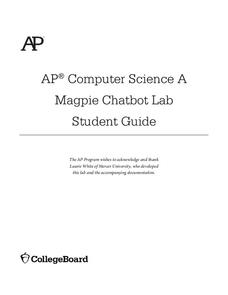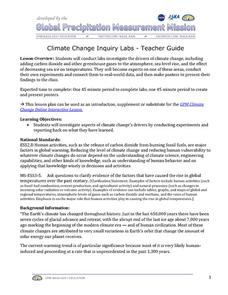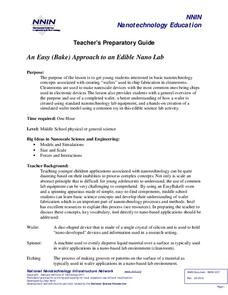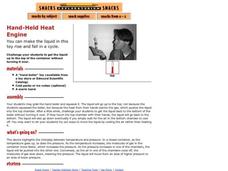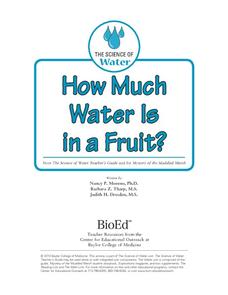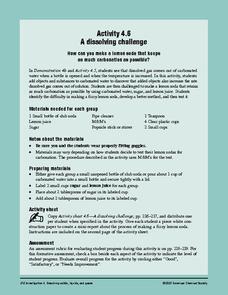G. Turrell
Science Activity 1: Light & Sound
Are you looking for lab sheets to go with your class experiment on plant response to light? You are no longer in the dark! This is a lesson that was written for a unit on light, but could easily be used to demonstrate plant behaviors in...
College Board
AP® Computer Science A: Magpie Chatbot Lab Student Guide
How is your computer or phone able to talk to you? Explore the tasks needed for a computer to understand human voice input and then write code for a Chatbot with this lab guide.
NASA
Climate Change Inquiry Lab
With global temperatures on the rise faster than ever recorded, the effects of a heating planet could be devastating. Allow learners to discover just what the world is in store for if the warming continues through a series of videos, a...
National Nanotechnology Infrastructure Network
An Easy (Bake) Approach to an Edible NanoLab
You can make it if you bake it! Young scientists model electronic chip fabrication with an easy bake oven. They create a design to embed in their brownie "chips" and compare their models to wafer production in basic nanotechnology.
New Mexico State University
Lab 6: Kepler's Laws
A 15-page package thoroughly teaches your physics or astronomy learners about Kepler's three laws of planetary motion. Each one is stated and explained. Class members answer questions, solve problems, and participate in the classic...
Curated OER
Plate Tectonics
Help young scientists piece together the theory of plate tectonics with this comprehensive collection of materials. Whether your are looking for worksheets, hands-on activities, or assessments, this resource has everything...
Teach Engineering
Earthquakes Living Lab: The Theory of Plate Tectonics
Find out if your class agrees with Ice Age: Continental Drift ... or if it's just a fun family movie! Class members research the theory of continental drift, examine evidence of plate tectonics, connect...
Howard Hughes Medical Institute
Icefish Blood Adaptations: Antifreeze Proteins
Ever wonder how fish survive in freezing cold water—especially Antarctic waters? Some fish have an adaptation that lowers the freezing point of their life fluids. Learners model these adaptations in two lab explorations. The first...
Exploratorium
Diffraction
Kindle knowledge of how light travels by using this activity in your physical science curriculum. By setting up a candle flame or flashlight bulb and viewing it through a slit, observers of light see evidence of its wave characteristic....
Teach Engineering
Chromatography Lab
Groups use alcohol and chromatography paper to separate the color components of black ink. The purpose of the activity is to allow the class to become aware that mixtures exist in hidden places.
Science Matters
Mighty Microorganisms
How can you tell if a microorganism is helpful or detrimental to an ecosystem? Learners inspect slides or pictures of microorganisms and record their observations to...
Exploratorium
Hand-Held Heat Engine
See the direct relationship between pressure and temperature using these classic science toys. As individuals hold the glass bulb, the liquid inside reaches it's boiling temperature, which is just a bit above room temperature. As the...
Exploratorium
Bernoulli Levitator
Two versions of this activity are presented for you to choose from when teaching about Bernoulli's principle in your physical science class. One is a hands-on activity, while the other would be best used as a demonstration during...
Exploratorium
Thread the Needle
If you are setting up a rotation lab where learners are investigating vision at different stations, this activity can be used to explore depth perception. Setting up a giant needle eye, students attempt to pass a pencil through it with...
Teach Engineering
Cell Membrane Experimental Design
Grandma said to gargle with salt water for a sore throat. Was she right? In the last part of the seven-part unit, lab groups design an experiment to test a cells reaction to salt solutions. The pupils conduct their experiment to answer...
Adrian College
The Universe
Young scientists create a simulation of Hubble's law. Introducing the Big Bang Theory using balloons and a simple lab instructional activity, scholars complete a data table and perform analysis.
Royal Society of Chemistry
Some Reactions of Carbon Dioxide—Microscale Chemistry
Precipitation reactions are always interesting. How about one that forms a precipitate using a gas? Chemists of any age will enjoy this twist on a standard solubility lab. Partners observe the lack of interaction between sodium...
Teach Engineering
Light Intensity Lab
Let there be light. The last installment of a seven-part series has pupils conduct an experiment on light attenuation through different numbers of transparency sheets. They then relate the results back to how X-rays measure bone density.
Baylor College
How Much Water Is in a Fruit?
Compare the volume of an orange to the volume of liquid that can be extracted out of it. Also compare the mass of an apple before and after it has been dried out. In both of these activities, children find that there is an appreciable...
National Nanotechnology Infrastructure Network
Powers of Ten with the Blue Morpho Butterfly
Explore the powers of ten while examining a Blue Morpho butterfly wing. Learners discover there is a lot more than meets the eye when one looks close enough.
Cornell University
Sun or Water? or Both?
Over the course of 10 days, young scientists observe their cups of seed and soil—one that gets sun and water and one that gets no sun and only water. Then they reflect on the results of the experiment to determine if their hypothesis was...
Cornell University
Celebrate Urban Birds
Set up a 50x50 square foot area in a space at school and choose three days to go outside and observe the birds seen in a 10 minute span. The activity has learners tapping into their observation skills and creates awareness of the birds...
Integrated Physics and Chemistry
Law of Conservation of Matter
Does mass change during a chemical reaction? Demonstrate the Law of Conservation of Matter while encouraging class members to be creative with a two-part lesson. First, learners use Alka-Seltzer® tablets and water to demonstrate the...
American Chemical Society
A Dissolving Challenge
After collecting carbon dioxide bubbles from a cup of club soda, learners attempt to make their own lemon soda while preventing the loss of carbonation. They do so by creating a syrup before mixing the substances into the club soda....

